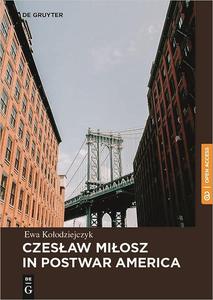
Free Download Ewa Koodziejczyk, "Czesaw Miosz in Postwar America"
English | ISBN: 8395669631 | 2021 | 395 pages | PDF | 1423 KB
Czeslaw Milosz is at times called an American poet. This means one thing in Poland, and something else in the United States. To Polish readers, this description is mainly related to the moment of his departure from Europe to take up employment at the University of California in Berkeley, and his settlement for many years in California, where his new poems and essays were written. Milosz is to them an American poet, in a biographical sense, from the time he started living at Grizzly Peak until his return to Krakow, and in a symbolic sense, for as long as he cooperated with the publishing market, participated in literary life, and was an ambassador of Polish literature across the ocean. He is an American poet to the extent that his work was influenced by the thought and work of those cultural circles.
However, one has to return to the landmark year of 1960, when Milosz had only set off for Berkeley, and ask about the awareness with which he discovered America, where he spent those consequential five years fifteen years before, and where he apparently took refuge from the consequences of the Sovietization of his native part of Europe. He returned to America as someone familiar with its realities and its lifestyle, with the reasoning and actions of its people, aware of many local customs and problems, well versed in various circulations of culture and information, fluent in English, with a rich and current knowledge of the literature of the linguistic circles that permeated it.
Little is known about the postwar period, when Milosz built this extensive awareness. For various reasons, it has not been the subject of investigations and research. Not only because the question of the poet's American traits, posed ever more eagerly today, hides the assumption that it refers to his California period treated as a phase of life and creativity which is closed both temporally and intellectually. Such a formulation of this question also results partly from the Polish understanding of the label of an American poet. However, this question gains its full meaning only when its scope includes, firstly, the realization that 1960 was not the initial year in Milosz's learning about America - it only marked a renewal of this process in a more complex way. Secondly, the question should include our awareness of the baggage of Milosz's experiences accumulated in the 1940s, with which he reentered the New World. In other words, understanding the process of taking root in California after 1960 is possible when we, as Milosz himself did, take into account his American postwar period, thought-out, problematized and reassessed in Europe after 1950.
This book aims to show how Czeslaw Milosz assimilated America from 1945 to 1950, how he expanded his cultural horizon there, incorporating various components within it. The subject of my interest has been, on the one hand, the sphere of his activities in many areas at the time, and on the other, the ways of making use of the intellectual opportunities that his stay in America created for him.
The book consists of four parts, each dedicated to a different aspect of Milosz's five years in America and based on archival research. The first part is a biographical reconstruction of his diplomatic and literary activities, the second discusses his lectures, articles and opinion journalism, the third recreates the process of his study of English-language literature, and the fourth examines the ways in which he assessed the postwar experience in his poetry, essays, and correspondence. While the last part concerns the period when Milosz, residing in France, looks back on the American years, which to a large extent influenced the new way of interpreting them, the three previous ones concern the common five-year period and constitute a mutual reference system.
Read more
Czesaw Miosz in Postwar America Torrent Download , Czesaw Miosz in Postwar America Watch Free Link , Czesaw Miosz in Postwar America Read Free Online , Czesaw Miosz in Postwar America Download Online
